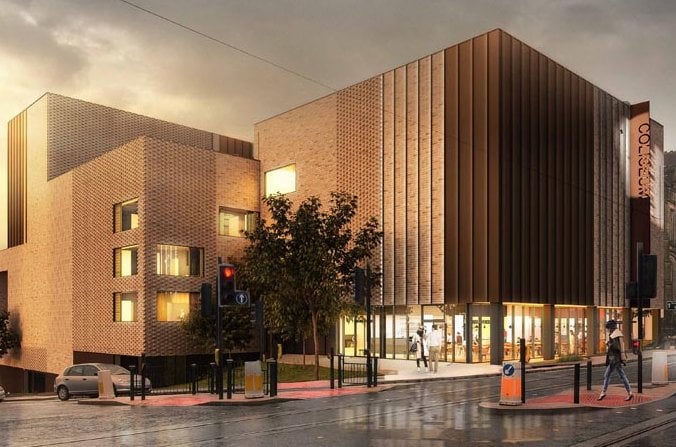
Photo: Mecanoo
All welcome at the Coliseum
Oldham Coliseum’s new extension will provide access for everyone to future-proof itself in a borough that is home to many people with disabilities, writes Kevin Shaw.
Currently operating a building that dates back to 1887, Oldham Coliseum Theatre is at the same time making plans for a new state-of-the-art building, due to open in 2020. The historic theatre presents access challenges due to its age, so central to the planning for the new building is being as accessible as possible to everyone.
Levels of disability
The borough of Oldham has higher than average levels of disability – 14% higher than both the region and England as a whole, based on the DDA (Disability Discrimination Act) definition. With an ageing population, there will be increasing levels of acquired disability.
We consulted a range of people who have access requirements to list their positive and negative experiences of attending theatres
Over 80% of our audience is over 55 and we estimate that at least 20% have some hearing impairment. There were more than 2,400 people between the ages of 14 and 64 with autism spectrum disorders (ASD) living in Oldham in 2015 and the majority of these were male. A further 4,000 people over the age of 18 have a learning disability. We also know that carers and families of people who are hearing-impaired or have learning difficulties or ASD really struggle to find relaxed activities that they can share together.
By making our new venue as accessible as possible, we’re future-proofing against audience drop-off.
Collaboration and expertise
Inclusivity and care for our audiences is not just one department’s responsibility, so a working group is collaborating across front of house, box office, production, programming and learning and engagement. We sought expert help where we felt we needed support, engaging Julia Keenan, a consultant specialising in inclusive practice, who’s helping us to better understand disability in a holistic way and how it relates to our entire operation.
We share our experiences, our resources and work strategically with colleagues from Greater Manchester venues at regional access meetings and meetings of the Greater Manchester Cultural Group for Deaf People.
Accessible spaces
Every public space in the new Coliseum will be fully accessible and there will be a Changing Places facility in addition to accessible toilets.
There will be increased seating for wheelchair users in the stalls and the dress circle in the main theatre, and across the studio theatre, meaning we can easily accommodate a wheelchair-user who books tickets on the evening of a performance. With better accessibility in our backstage areas we’ll also be able to accommodate actors who use wheelchairs or have a mobility impairment.
There will be a dedicated room at the back of the auditorium to accommodate an audio describer and with fully accessible backstage facilities we will be able to provide touch tours for visually impaired audience members with ease.
The theatre will benefit from an infrared audio enhancement system and a mobile connect system, which allows audiences to gain audio enhancement through their own smart device. We will also have mobile infrared loops in participant spaces where workshops will be held, and induction loops at the box office and in our bar areas for audiences and participants who have hearing impairments.
The Coliseum offers hands-on work experience in backstage areas as part of our teaching theatre programme and our new building will have a tension wire grid in the studio theatre. This will enable us to work with participants in lighting design without the use of ladders.
Consultation with audiences
Consultation with current, past and prospective audiences is vital for the theatre’s new building. We’re speaking to people in as many ways as possible – through focus groups, phone interviews, conversations on social media and talking to audiences whenever we meet them.
Back in January we held the first access focus group for the new building so that we could better understand the experiences of disabled people when attending the theatre and include their voices in our strategic planning. We consulted a range of people who have access requirements to list their positive and negative experiences of attending theatres, with a specific focus on our move to a new purpose-built theatre.
As we move closer to the opening we’ll be working with more focus groups regarding the clarity of the signage, and considering audience members with dementia, will be looking at how we can make the building’s entrance as welcoming as possible.
In August the Coliseum became one of the first national cultural organisations to adopt the Family Arts Campaign’s new Age Friendly Standards, developed in consultation with experts including Age UK, 170 arts and cultural organisations and older arts attenders. The standards provide specific guidance on welcoming older people and we will be displaying the new kite-mark affirming that the organisation has considered the complex needs of older visitors.
There are still more than two years until the opening and a lot of work has still to be done, but with a continuing process of working collaboratively within the theatre, with other theatres across the north west of England, external organisations and consultants, and consulting our audiences, we’re ensuring that our new theatre will be fully accessible and inclusive for everyone.
Kevin Shaw is Chief Executive and Artistic Director of Oldham Coliseum Theatre.
www.coliseum.org.uk
Join the Discussion
You must be logged in to post a comment.